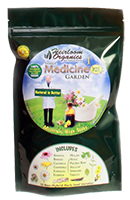|
Home > Guides > Herbs > Pleurisy Root |
|
How to Grow Pleurisy Root | Guide to Growing Pleurisy Root |
|
|
|
|
| |
 |
|
Overview |
|
|
|
|
|
| |
|
| |
Some Native American legends tell of the roots being used as a body wash for lifting and running strength. Also used as a drug in chant lotion, and as a ceremonial emetic. Asclepias tuberosa has a long history of use as a valuable alternative medicine and is one of the most important of the indigenous American species. Butterfly Weed is used internally in the treatment of diarrhea, dysentery, chronic rheumatism, and as an expectorant. It has a specific action on the lungs, making it a valuable medicinal herb in all chest complaints and in the treatment of many lung diseases. |
|
| |
|
|
| |
Growing Guide
GROWING NOTES
Pleurisy Root grows outward and to a height of around 36" and produces clusters of distinct orange flowers; a favorite of butterflies, hummingbirds and other pollinators.
Pleurisy prefers full sun and can do well with medium moist to dry soil but well-drained soil.
Pleurisy is best sown in fall, just below the surface of the soil (~3/8") with light tamping. Otherwise, it may be sown in the spring but will require a period of cold stratification. Seeds may be mixed with moistened starting medium, then placed into refrigerator for a period of around 4 weeks. Be sure to check periodically to make sure that mixture has not dried out-keep moist. If seeds begin to germinate, plant immediately.
MAINTAINING
After stratification, seeds may be started in flats in a greenhouse or similar warm indoor location. Tamp seeds lightly into surface of the soil, or cover with a thin layer of soil and moisten. Keep soil or potting medium moist until seeds begin to germinate. Transplant outdoors once first true leaves have developed and the threat of a spring freeze has passed.
|
|
| |
|
| |
Heirloom seeds are the gardeners choice for seed-saving from year-to-year. Learning to save seeds is easy and fun with these books. Before you harvest, consider which varieties you might want to save seeds from so that your harvesting practice includes plants chosen for seed saving. Be sure to check out our newest seed packs, available now from Heirloom Organics. The Super Food Garden is the most nutrient dense garden you can build and everything you need is right here in one pack. The Genesis Garden s a very popular Bible Garden collection. The Three Sisters Garden was the first example of companion planting in Native American culture. See all of our brand-new seed pack offerings in our store.
|
|
| |
|
|
| |
Harvesting Guide
HARVESTING
Harvest the taproot in fall after the plant has gone to seed, or early next spring. In some cases, root may be collected in the first year, but will likely require several years of growth to reach suitable size for collection. Exercise patience with Pleurisy-while it may take some time to yield medicine, it is a rich source of nectar to a variety of beneficial pollinators and is a lovely ornamental.
SAVING SEEDS
|
|
| |
|
|
|
| |
|
|
|
|
|
| You can find this variety in the following Seed Packs: |
|
 |
|
| Click the packs below to see some of our other wonderful products |
|
|
|
|
|
|
|